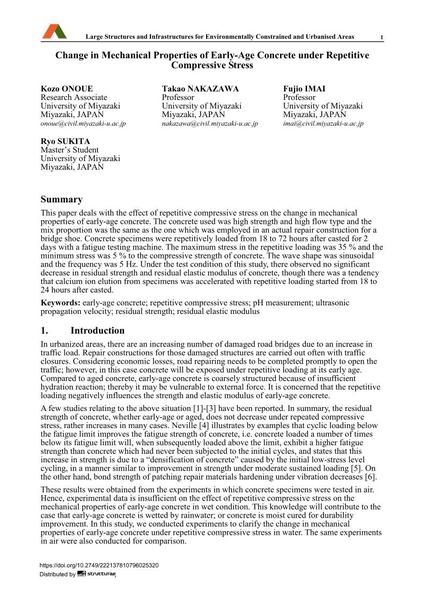Change in Mechanical Properties of Early-Age Concrete under Repetitive Compressive Stress

|
|
|||||||||||
Bibliographic Details
| Author(s): |
Kozo Onoue
Takao Nakazawa Fujio Imai Ryo Sukita |
||||
|---|---|---|---|---|---|
| Medium: | conference paper | ||||
| Language(s): | English | ||||
| Conference: | IABSE Symposium: Large Structures and Infrastructures for Environmentally Constrained and Urbanised Areas, Venice, Italy, 22-24 September 2010 | ||||
| Published in: | IABSE Symposium Venice 2010 | ||||
|
|||||
| Page(s): | 444-445 | ||||
| Total no. of pages: | 7 | ||||
| Year: | 2010 | ||||
| DOI: | 10.2749/222137810796025320 | ||||
| Abstract: |
This paper deals with the effect of repetitive compressive stress on the change in mechanical properties of early-age concrete. The concrete used was high strength and high flow type and the mix proportion was the same as the one which was employed in an actual repair construction for a bridge shoe. Concrete specimens were repetitively loaded from 18 to 72 hours after casted for 2 days with a fatigue testing machine. The maximum stress in the repetitive loading was 35 % and the minimum stress was 5 % to the compressive strength of concrete. The wave shape was sinusoidal and the frequency was 5 Hz. Under the test condition of this study, there observed no significant decrease in residual strength and residual elastic modulus of concrete, though there was a tendency that calcium ion elution from specimens was accelerated with repetitive loading started from 18 to 24 hours after casted. |
||||
| Keywords: |
residual strength early-age concrete repetitive compressive stress pH measurement ultrasonic propagation velocity residual elastic modulus
|
||||
